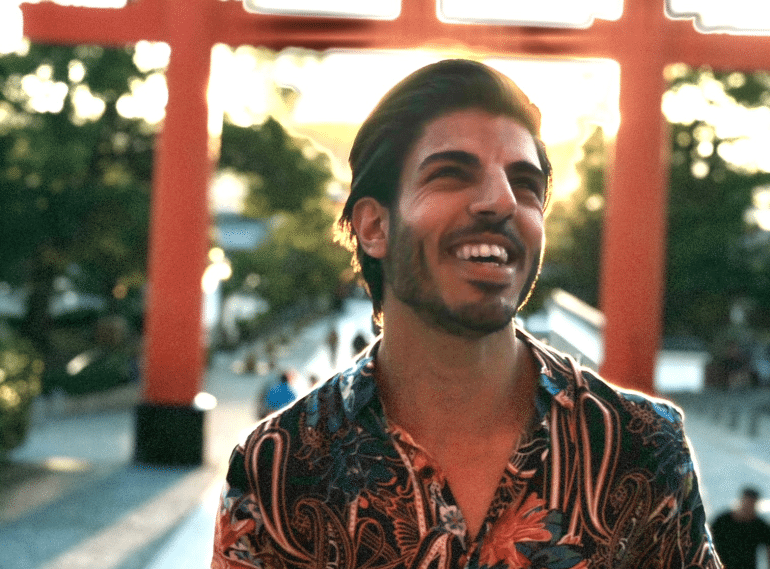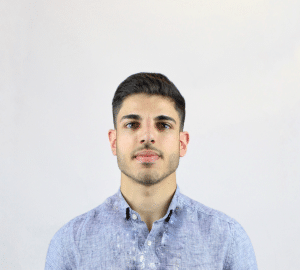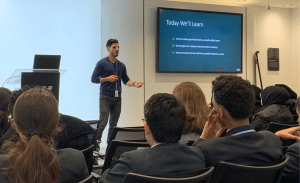
Andrew Kettenis’ work as a digital experience consultant can be both diverse and sometimes high-profile: recent projects have included working on the UK’s vaccine roll-out and providing support for an AI-powered automatic ship, the Mayflower.
 And the ship’s purpose – gathering data about the oceans for scientists looking at climate change, pollution and marine conservation – points to an area of focus for Andrew, namely sustainability.
And the ship’s purpose – gathering data about the oceans for scientists looking at climate change, pollution and marine conservation – points to an area of focus for Andrew, namely sustainability.
After four years with IBM, he is currently transitioning to a new job as a UX (User Experience) designer with a leading London agency – “exactly what I enjoy doing”.
And yet Andrew (OE 2003–2010) acknowledges that his professional life today is very different from the career he expected when he was at School. “When I look back at my subjects for A-level, the two I focused on myself were Maths and Economics, but when I look at what I use, it’s Design. I use the principles I learned in it every single day, yet it felt at the time like a bit of a rogue one!” (Andrew also pays tribute to the support of Ian Clift, his Design Technology teacher.)
After leaving School in 2010, he went to study at Birmingham. “At university, I did International Relations, with Economics ‘on the side’. In normal QE fashion, I was intending to focus more on the Economics and how that might relate to finance, but I actually enjoyed the politics side more, especially the sociology.
“My whole career view changed quite a bit, taking on a more human-centric focus, particularly with regard to sociology and how technology relates to that.”
Reflecting on all this, Andrew has his own advice for current QE pupils: “Follow the things you love, and lean into the things you love and that you find special or unique about yourself.” Unless boys are set on a very specifically vocational degree, they should choose a university subject simply because they find it interesting, he says.
After completing an MA at Birmingham in International Law, Philosophy and Politics in 2014, Andrew worked for a few months as a technical specialist for Apple. He then headed off to Osaka in Japan, where he spent 16 months as an English language teacher.
“I loved it. It was one of the hardest, but also by far the best, two years of my life,” he says, adding that he was speaking Japanese at conversational level within six months and learned many transferable skills. At QE, he had been a keen member of the robotics club. That experience now came into its own: “I brought a lot of that to my classes, using technology as a medium. I took a very tech-centric approach to my lessons.”
It is an approach which he has followed in his subsequent career. “Technology is an effective tool for social change and is pretty central to any social or entrepreneurial mechanism.”
 He worked briefly for specialist IT training consultancy Optimum Technology Transfer – “a really good job” – and then went to IBM in 2017.
He worked briefly for specialist IT training consultancy Optimum Technology Transfer – “a really good job” – and then went to IBM in 2017.
“IBM is where I found essentially what I will be doing for the foreseeable future – product and service design.”
Among the projects he has enjoyed most recently has been his work on the Mayflower Autonomous Ship project. “What the Mayflower essentially is, is an AI-powered automatic ship that has been developed by ProMare, a marine research and exploration company, in partnership with IBM. It incredibly important for our sustainable future to understand how our planet is changing. It’s really cool!”
Andrew’s side of the work has been to help design the people-facing digital products that will be used by scientists and by the wider public.
The ship has already been launched and is due to go on its first mission in a few weeks, sailing from Plymouth in the UK to Plymouth in Massachusetts – hence its name, recalling another pioneering venture, that of the Pilgrim Fathers, who established the first permanent settler colony in New England after arriving at Plymouth Rock aboard their own Mayflower in 1620.
He has also been involved in some of the UK vaccination work, re-designing the experience from a service user’s perspective, so that it works better and reduces waste, looking not at apps or the website, but at the general experience being offered.
“UX design is about what the end-to-end journey looks like,” says Andrew, who adds that his aspiration is to cultivate his skills “for a wider societal impact”.
He has developed a specialism in the sustainability of supply chains and products. He has, for example, just finished working with an automotive company to help them with their thinking about the future – “the big stuff, envisioning exactly how they will provide energy and mobility to people – how energy and electric vehicles tie into our future”.
Andrew, who is based in London, helps a number of mindfulness charities on a pro bono basis. He has worked with Dose of Nature, a charity promoting the benefits of engaging with the natural world which “does some really good work in mental health”.
He is encouraged by the ethical approach of many of his fellow OEs: “They are an upstanding bunch of human beings – just really good people, whatever path they have gone down, which I think is super-encouraging.”
A music-lover and media enthusiast, Andrew also enjoys gaming in his spare time. To find out more about Andrew’s projects and interests, visit his website.
